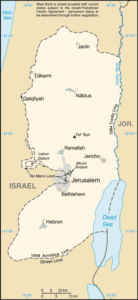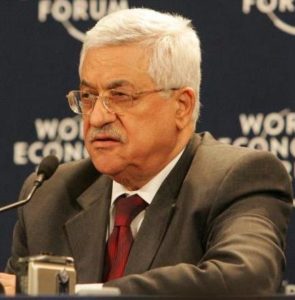Two interesting things happened in the Palestinian-held territories last Sunday.
The destruction and threats were allegedly motivated by the UN “promoting immorality” at summer camp (I can just hear the Camp Ramah directors look up in interest…) A statement issued two days before the attack accused the camp of “teaching schoolgirls fitness, dancing and immorality.” A quarter of a million Gaza children were due to attend the camp and participate in “immoral” UN activities prior to this “act of protest” against “fitness.”
Meanwhile, in the West Bank, Israel announced the removal of 60 checkpoints after a very positive meeting between Palestinian Authority (PA) officials and IDF generals. In addition to dismantling the checkpoints, Israel plans to simplify entry to the West Bank for business and tourism, granting tourists and tour guides entry to Bethlehem, enabling Arab-Israeli civilians to travel to the West Bank, and facilitating travel for senior Palestinian businessmen through security crossings, all of which are expected to help revive the West Bank economy.
In fact, (I’m a finance person, so I care about such things), while we’re sitting in this whole “global recession” thing out here, the West Bank economy actually grew 7% last year! That’s while markets were tanking all over the world, unemployment was through the roof, and I don’t even want to start on housing prices. While Greece and California were headed toward outright bankrupcy, the West Bank experienced an outright economic boom (possibly the only one in the world last year).
Construction is booming in the West Bank. At this very moment, with new building essentially frozen in the United States, you can actually stand in Jerusalem, and see the construction cranes lining the horizon in the West Bank. Construction for the first new Palestinian town in decades began earlier this year. A 7-story home furnishings store (Herbawi Home Furnishings, in case anyone’s on the market or needs a wedding registry) has opened in Jenin. The first movie theater in 2 decades opened in Nablus last summer (and I hear it went from showing Pirates of the Caribbean last summer, to showing Avatar this spring… I’ll leave it to the arts column to comment on their taste in movies).
So why am I telling you all this?
It’s not to make you all rush out to invest in West Bank stocks and real estate (I swear! This does not constitute investment advice, and any losses sustained are not my responsibility. I hope that’s enough to keep the TC Jewfolk lawyers off my back).
The reason I mention this is quite simple. I would like to go on the record to say:
DOWN WITH THE TWO STATE SOLUTION
I’ve had enough. It clearly hasn’t been working out. And I’d like to propose that it doesn’t even make any sense. Never did, in fact. It was just the stuff of someone’s confused LSD trip, as far as I can tell. And not a good trip, either.
You see, the Gaza Strip and the West Bank are not just heading in opposite directions now, with the West Bank booming, while Gaza is making greater and greater strides toward illustrating the concept of “Hell on Earth.” Gaza and the West Bank were NEVER the same. They were never even similar. And they have never been united.
Gaza had always been controlled by Egypt (since the British left in 1948). Gazan arabs speak the Egyptian dialect of Arabic. A large proportion of the Gazan population are refugees.
Meanwhile, the West Bank was controlled by Jordan. They actually speak a different (Jordanian) dialect of Arabic. A much larger proportion of their population are not refugees at all, but for instance, arabs who had lived in Nablus or Hebron or Bethlehem prior to 1948, and are still living there.
West Bank arabs even have significantly fewer children than the Gazans. They live more secular lives. They are much more likely to have jobs. And to interact with Israelis. In short, these are 2 different populations, with 2 different cultures, and 2 different histories and experiences – for the last 3 generations at least.
Even their attitudes toward peace are different. While Gaza is overrun by Hamas terrorists, who are shutting down women’s theater groups, vandalizing camps for encouraging fitness for girls, and complaining that UN camps “promote conciliation between Palestinians and Israelis,” the West Bank is full of music stores blasting sappy love songs into the streets, and Israeli journalists are now complaining that there are no terrorist leaders to be found in Nablus for an easy front-page interview in Ha’aretz anymore. (Dudes, I feel your pain! It’s tough to just make this stuff up!)
So I would like to propose that we forget this whole business of 2 states, trying to mash the West Bank and Gaza into one single unified whole. How about a 3-state solution instead? (We can call it the “Jenna Mitelman Road Map,” if we must. I’m always willing to sacrifice for the greater good.)
Just think about this – let’s say the Israeli Prime Minister woke up tomorrow just totally ready to make peace, give in to any demands, give away everything – whom would he even call? Seriously – does he have anyone to actually give it away to? Whom can he have a single negotiation with? Abbas in the West Bank? Hamas in Gaza? They won’t even talk to one another!
But imagine this instead – Israel and the West Bank continue making peaceful overtures to one another, remove some more checkpoints, let the economy rebound, bring in more tourists, open people up to one another more – and eventually, settle on a peaceful resolution with the West Bank. Call it “East Palestine,” say (or something else more spiffy. I don’t insist on naming rights.)
If Gaza is willing to talk, great! It can be “West Palestine” (or “Palestine on the Beach.” Or Gaza, if it insists. Or even Hamastan.) And if they’re not, that’s fine, too. There can be peace and prosperity and economic exchange with the West Bank Palestinians, and Hamas in Gaza can continue to bury their people in a new, Middle East reincarnation of Somalia as long as their people let them. Why force them to go down the same road if they are clearly facing in opposite directions?
Even Palestinian President (and West Bank big kahuna) Mahmoud Abbas is starting to see things my way (go TC Jewfolk marketing department!) Yesterday, he spoke out against Iran’s influence in Gaza, saying that
“The Palestinian people’s unity… is not in our hands.”
Hear, hear!
He also said that
“peace could be achieved in a week”
Now, could anyone reading this seriously imagine a Hamas spokesman (and let’s not have any doubts here that it would be a man) saying the same thing?
So let’s allow Mr. Abbas to get his “peace in a week.” And let’s not let Hamas intransigence and some amorphous ideas of joining two halves that do not fit stop him. Let’s embrace the 3 state solution, and see what that gets us. I sure bet it won’t be worse than the brilliant success we’ve had with the 2 state plan. Who’s with me?
Note: The LA Times wrote about the lack of historical basis for the 2 state solution back in 2007. You can read all about it here.
[Photos: WILPF, Wikipedia, za3tar, Wikipedia]








Nice suggestion. Radical concept — people who are acting as if peace matters are negotiating partners and people whose idea of a good time is to slash and burn everything in site are not. Let’s all wake up and smell the Hummus.
well-written. my question is why didn’t this “split” happen before?
Ben –
Thank you! That’s actually an excellent question. And like many things in the region, the answer is largely a matter of nothing more than politics.
Basically, prior to the late 1960’s, the 2 regions were controlled separately by Egypt and Jordan, and so they were largely thought of separately, and there was not any thought of them as a single entity.
However, after the 1960’s, the PLO (the Palestine Liberation Organization, controlled by Yasser Arafat) largely took over as the dominant political force in both areas, and in the 1990’s, certainly took over both areas and established fairly exclusive political control. Since they were run by a single “President-for-Life” type of entity, they began to be treated as a single political unit.
Essentially, as is often the case in unstable regions, a single essentially dictator controlling both areas led to them being thought of, and dealt with politically by other countries, as one. But culturally and socially, the 2 areas remained just as separate, and after Yasser Arafat’s death and Israel’s pullout from Gaza, they are now back to being politically separate for the first time in decades, as well. Which makes this a wonderful opportunity for the whole world to look up and say, hey, we could treat them differently again, couldn’t we? And maybe that will give us the answer we’ve been looking for all along (or at least a large part of it).
Hamas is the rightfully elected government of the Palestinian people and Ismael Haniyeh is the prime minister. Either accept democracy or don’t. Israel and the US played a dangerous game by trying to implement democracy in both the territories and in Iraq. Now we are dealing with the fruits of that dangerous endeavor. For all those people running around hailing Israel as some great democracy, they should be consistent and also hail the Palestinians.
Yehoshua,
I think you’re right that Hamas is a fairly elected government (even Jimmy Carter agreed that election was fair), and they will remain in power in Gaza so long as their people are willing to tolerate such a government. By the way, I think that tolerance is starting to wane, and the support for Hamas in Gaza is starting to slip, but that is a topic for another day. But as I said, as long as the people of Gaza are willing to accept Hamas as their government, they will continue along the path of violent resistance, Islamist rule, and no peace.
However, I say we accept whatever Gaza chooses to do, and attempt to build peaceful coexistance with the Palestinians in the West Bank, who are not ruled by Hamas. And if the people of Gaza see a successful peace right next to them, perhaps they will want a better, more peaceful life for themselves, as well. And that will be for them to decide in ousting Hamas when that day comes. But in the meantime, why shouldn’t we pursue peace with any who are willing to talk and compromise, instead of embracing violence?
~Jenna
In response to Yehoshua —
Yes, “Hamas is the rightfully elected government of the Palestinian people and Ismael Haniyeh is the prime minister.” And Mahmoud Abbas is the rightfully elected president of the Palestinian people. That’s the form. The substance is that they are leaders of two competing armed factions. The substance is that, since a mini-civil-war in 2007 in which Hamas kicked Fatah out of Gaza by force of arms, and in return got similarly kicked out of the West Bank. These two lawfully elected leaders (Hanieh and Abbas) now control two separate territories.
And, to address a larger issue — so what if they were lawfully elected? They are not any more or less Israel’s enemies for it. I hesitate to bring this in, but it happens to be on point — Hitler was the lawfully appointed chancellor of Germany. (President Hindenburg, in the course of the workings of German parliamentary democracy, turned to lawfully elected member of parliament Adolf Hitler after leaders of other parties each failed to form a governing coalition.) So? It didn’t stop him from taking more power later, unlawfully (as Hanieh and Abbas have each done), and it didn’t make the war any easier or harder.
My point in saying that Hamas was democratically elected wasn’t to highlight the situation in a positive light. It’s the exact opposite. The Palestinians elected a government that is diametrically opposed to the existence of the Jewish State on one inch of Dar al-Islam. Therefore Israel is at war with these people. Of course not every individual supports Hamas, but neither did every German support Hitler or Russian Stalin. Jenna, I appreciate your comments regarding building up the West Bank instead of Gaza, as they echo several conversations I had with Professor Yitzhak Reiter of Hebrew University. On paper it sounds great, but what’s the end game and final status? I’m sorry but I’m more pessimistic than you. Israel has two choices (or variations of them): give back the land for a Palestinian state or annex it. Both come with considerable repercussions but the fact of the matter is that the status quo is not working either. There has to be some kind of substantial movement. The Palestinians have wised up and realized they will not win any military conflict directly, therefore they have moved onto delegitimization, and are quite successful as recent events have so aptly illustrated.
Another point I would make is in regards to the constant rhetoric used to legitimate Israel by constantly pointing out that it’s a democracy and that by default America or Europe should somehow automatically support it because of that fact. America or anyone else will back Israel out of self interest, not whether it’s a democracy, as if that is some sort of positive thing per my discussion of Hamas being elected, or Mike’s reference to Hitler. The United States is also great friends with Saudi Arabia and China, and whether that is good is up to the individual’s own moral judgment. The problem is that Israel has now become a liability to America. I’m truly afraid the direction this administration has gone. If Israel can’t rely on America, who can it rely on?
I’m with you. well put.
also see my 2 cents here:
http://westbankspiralplan.blogspot.com/